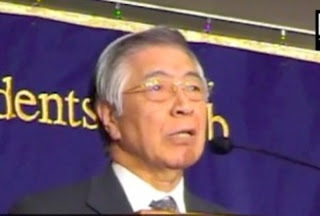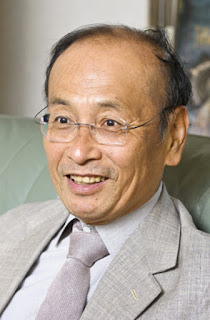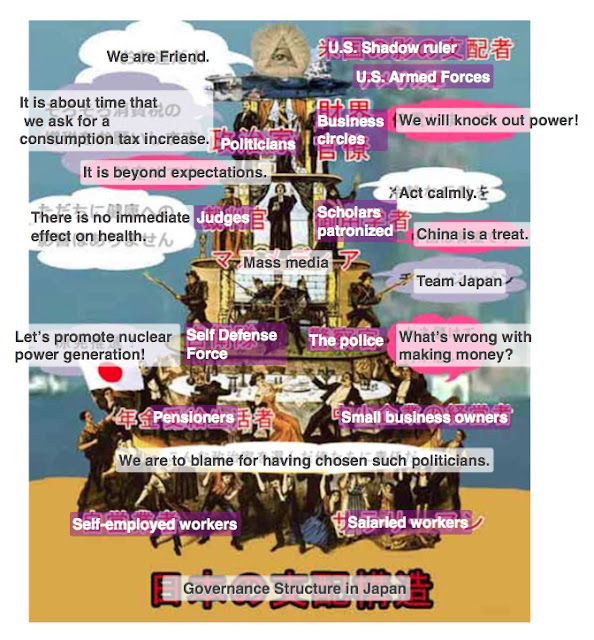Normal
0
10 pt
0
2
false
false
false
EN-US
JA
X-NONE
$([{£¥‘“〈《「『【〔$([{「£¥
!%),.:;?]}¢°’”‰′″℃、。々〉》」』】〕゛゜ゝゞ・ヽヾ!%),.:;?]}。」、・゙゚¢
It is unbelievable act of violence. This case will make the people recognize that
the Supreme Court is definitely evil.
Masatoshi
Takeshita
English translation of a Japanese article: ‘The
Northern Wind Will Blow Soon’ blog – October 22, 2012 –
Comment on Supreme Court’s Decision:
Eisaku Sato
Mr. Eisaku Sato is the former Fukushima
prefectural governor.
Mr. Sato gained the reputation as a “fighting
governor” and won overwhelmingly wide support in the prefecture because he
voiced an objection against Tokyo overconcentration and challenged the
government policy on nuclear power plants and regional system.
He had continued to strongly oppose to a plutonium-thermal
power generation project since the TEPCO covered up accidents.
In September, 2006, 18th year as
governorship in the 5th term of office, he was grilled on a bribery
scandal over a dam construction for which the prefecture placed an order,
resigned as governor, and then was arrested. In October, 2009, he was
found guilty at the second trial as well as the first trial, with an unprecedented holding of “nil bribe-taking.” He was appealing to a final court.
Comment on Supreme Court Decision by
Eisaku Sato October
16, 2012
I’d like to post my comment sent to newspaper
offices after receiving the Supreme Court decision, in my blog, too.
Today, on October 16, the
Supreme Court has decided to turn down an appeal from me, Eisaku Sato.
I am not guilty over
bribery charge questioned in this trial and the top court ruling is unacceptable.
I feel very disappointed at the judiciary of this country which ignores the
truth.
At first rate, this case was castles in the
air, in which ‘something’ was created out of ‘nothing.’
My brother and I were suddenly arrested on charge
of bribery and forced to make a confession to a crime of which we knew nothing,
by the prosecutor of the investigative team from the Tokyo District Public
Prosecutors Office in the interrogation room of the Tokyo detention house
isolated from the outside world.
My supporters have been all summoned by the
investigative team and have undergone severe interrogation, which has resulted
in an attempted suicide. I suffered a lot in a cell and made a false
confession to the crime one time, thinking that “I will take the rap so as to
save my supporters.”
However, with the start of the trial,
requirements for bribery charge were overrode one after another. My alibi
was proved because “God’s Word” which allegedly I said to the head of the civil
engineering division at the governor’s room was considered to be impossible.
Isao Mizutani, former
chairman of Mizutani Kensetsu Co., testified that “I bought a land lot owned by
the governor’s brother’s company with a bribe to the governor.” Later he
testified that “Although I testified so by transactions made with the
prosecutor, the truth is different. The governor is innocent.”
The team’s plan to indict me on a bribery
charge came to nothing.
My brother heard the
prosecutor in charge say this in the interrogation room of the Tokyo detention
house.
“Governor Sato is not
good for Japan. He will be eliminated in the near future.”
Looking back, this could
have been what the scandal is all about.
During the term of office, I severely
confronted the character of the country and the utility firm, which tried to
cover up the accidents and troubles at Fukushima No. 1 and No.2 nuclear power
plants of TEPCO, to secure safety of 2.1 million citizens of Fukushima
Prefecture.
As for putting into practice a plutonium-thermal
power generation project, I established “Energy Policy Investigative Commission”
to repeat discussions and refused the project because I found it questionable.
The scandal took place in the midst of such “cut and thrust.”
Very regrettably, three nuclear reactors
including Fukushima No. 3 reactor where power was generated by
plutonium-thermal use suffered meltdowns. My concern became reality in an
unexpected fashion
Our irreplaceable “Hometown Fukushima” was
contaminated and many residents of the prefecture are still forced to evacuate
their homes.
The people of Fukushima are forced to bear
hardship and live an uneasy life. The very thought of it make my heart
break.
On the other hand, it was revealed that
evidence of floppy disks was falsified in the postal injustice case immediately
after my case. The aggressive way for the investigative team to conduct
an investigation by making an unnatural story was brought to light.
Prosecutor Tsunehiko
Maeda got a prison sentence in the floppy falsification case and served time in
prison. It is Prosecutor Maeda himself that interrogated Mr. Isao Mizutani
in my case and approached him with a deal.
It is natural that my
case should have been reexamined and I should have been found innocent.
However, I hear that the
Supreme Court turned down both appeals from me and the prosecutor.
The final and binding
judgment of second instance rendered by the Tokyo High Court was very strange.
Although the court acknowledged that my brother and I had been found guilty of
bribery, it admitted no surcharge, that is, “zero of bribery amount.”
And the verdict suggested that “there is a
possibility that the governor did not have the slightest recognition of
bribe-taking.” If so, I should have been found innocent. However,
the Court adjudicated me of guilty though practically innocent, to save the
face of the investigative team.
Today’s decision
indicates that the Supreme Court, the highest judicial organ, has officially admitted
the judgment of second instance to curry favor with the team. I, as the person concerned, am indignant with the Court for
its injustice. At the same time, I am worried that this decision will definitely
lead to serious problems in the future of Japan.
i
Residents of Fukushima Prefecture and the
people of Japan,
I’d like to keep on fighting for an
acquittal, including appeal for retrial, while consulting with my lawyers.
I ask you to let your heart go out to me.




